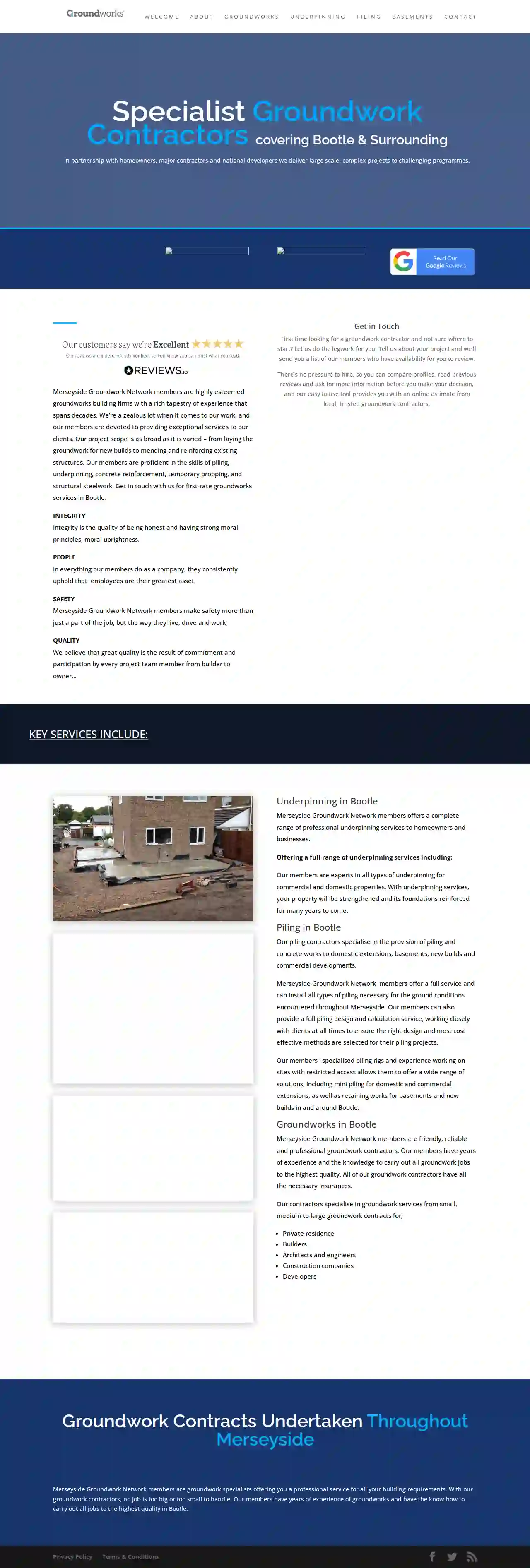Excavation Contractors Crosby
Top 10 Excavation Contractor in Crosby
Get multiple Excavation Contractors Near Me quotes for your project today! Compare profiles, reviews, accreditations, portfolio, etc... and choose the best service.

Buller Driveways
134 Old Farm Road, Crosby, Liverpool, L23 2RZ, GBWelcome to Buller Driveways Welcome to Buller Driveways. We have been constructing stunning driveways and patio areas for our clients across the North West for over two decades. We work with you to ensure the process is kept easy from planning to building. Why We Are Different Buller Driveways focuses on key areas that are expected and searched for by our clients: Timekeeping, presentation, affordability and expertise are all areas of our work that we aim to excel in, to ensure that our clients get a flawless experience. How We Help We aim to make what can be a daunting process of getting a new driveway an easy and enjoyable one! From free no obligation quotes to on site surveys and consultations. Every measure is taken to ensure your next project with us runs flawlessly. Ensuring A 5 Star Service Here at Buller Driveways we aim to offer anyone and everyone who uses us a complete five star service. No matter how much you spend or how big your project is. You can rest easy knowing that we strive to provide every customer with the bespoke driveway service that they deserve.
- Services
- Why Us?
- Testimonials
- Gallery
Get Quote
L and S Groundworks
1Bootle, GBMerseyside Groundwork Network: Your Trusted Groundwork Partner in Bootle Merseyside Groundwork Network is a collective of highly skilled and experienced groundwork contractors serving Bootle and the surrounding areas. We are dedicated to delivering exceptional services to homeowners, major contractors, and national developers, ensuring that every project, no matter how complex, is completed to the highest standards. Our members are experts in a wide range of groundwork services, including: Underpinning Piling Concrete reinforcement Temporary propping Structural steelwork We are committed to: Integrity: We uphold the highest ethical standards in all our operations. People: We recognize our employees as our most valuable asset. Safety: Safety is paramount in everything we do. Quality: We strive for excellence in every project, ensuring the satisfaction of our clients. Whether you're planning a new build, an extension, or need to reinforce an existing structure, our members have the expertise and experience to handle your project with precision and care. Contact us today for a free consultation and let us help you bring your vision to life.
- Services
- Why Us?
- Gallery
Get Quote
L.E.L Civils LTD
53 reviewsStopgate Lane, Simonswood, Liverpool, L33 4YD, GBWelcome to L.E.L Civils LTD LIVERPOOL GRABS, TIPPERS & Aggregates Get in Touch About Us Grabs & Tippers Suppliers of Aggregates As a registered waste carrier, L.E.L Civils provide a fleet of Grab Wagons & Tippers throughout the North West. One of the many services we provide is the removal and disposal of soils, clay, hardcore and green waste all disposed of at our licenced tip. Suppliers of Aggregates Suppliers of Aggregates We also supply a range of aggregates and commercial topsoil, including recycled/quarried, MOT stone, crushed brick, grit /building sand, different sizes of clean stones, pipe bedding Trusted & Experienced Hardcore Tipping Facilities Our management staff and operators hold over 40 years of experience in the Civils and Groundwork sector and can ensure your every need will be catered for, with unbeatable prices. Hardcore Tipping Facilities Hardcore Tipping Facilities Here at LEL civil we act ethically to ensure we do our bit for the environment. Which is why we endeavour to recycle our waste when possible and to dispose the rest safely.
- Services
- Why Us?
- Gallery
Get Quote- FJ
FJC Supplies
51 reviewsBootle, GB- Services
- Why Us?
Get Quote - O’
O’Donnell Groundworks Ltd
1Bootle, GB- Services
- Why Us?
Get Quote - Th
The Oakwood Group
11 reviewsBootle, GB- Services
- Why Us?
Get Quote - As
Asbestos Removal Bootle Ltd
51 reviewsBootle, GB- Services
- Why Us?
Get Quote - St
SticX
51 reviewsBootle, GB- Services
- Why Us?
Get Quote
Over 11,537+ Excavation Companies registered
Our excavation contractors operate in Crosby & surrounding areas!
ExcavationHQ has curated and vetted the Best Excavation Pros in Crosby. Find a trustworthy pro today.
Frequently Asked Questions About Excavation Contractors
- Project Size and Scope: Larger, more complex excavations naturally take longer.
- Soil Conditions: Rocky or challenging soil types can slow down progress.
- Site Accessibility: Limited access might require more time for maneuvering equipment and hauling materials.
- Weather: Inclement weather can cause delays.
- Permitting and Inspections: Waiting for permits or inspections can extend the timeline.
- Clearly Define the Scope: Outline the project's goals, including the excavation area, depth, grade, and intended use.
- Obtain Necessary Permits: Research and acquire any required permits from your local authorities.
- Mark Utility Lines: Contact your utility companies to locate and mark underground utilities to prevent damage.
- Communicate with Neighbors: Inform your neighbors about the project's timeline and potential noise or disruptions.
- Prepare the Site: Clear any obstacles, such as vegetation, furniture, or structures, from the excavation area.
- Discuss Safety Protocols: Review safety procedures with the contractor to ensure a safe work environment.
How long does an excavation project take?
What is the difference between cut and fill excavation?
Cut: Involves excavating soil from an area where the existing grade is higher than the desired grade.
Fill: Refers to using the excavated soil ('cut' material) to raise the grade in an area where the existing grade is lower than desired.
This method minimizes the need to import or export soil, reducing costs and environmental impact. It's commonly used for site preparation, road construction, and landscaping.
What should I do before excavation starts?
What is the difference between topsoil and subsoil?
Topsoil: The uppermost layer, typically rich in organic matter, nutrients, and microorganisms. It's essential for plant growth and is often darker in color.
Subsoil: The layer beneath the topsoil, containing less organic matter and generally denser. It provides support for roots but is less fertile than topsoil.
During excavation, topsoil is often removed and preserved separately for later use in landscaping, while subsoil is typically used for backfilling or other less demanding applications.
How long does an excavation project take?
- Project Size and Scope: Larger, more complex excavations naturally take longer.
- Soil Conditions: Rocky or challenging soil types can slow down progress.
- Site Accessibility: Limited access might require more time for maneuvering equipment and hauling materials.
- Weather: Inclement weather can cause delays.
- Permitting and Inspections: Waiting for permits or inspections can extend the timeline.
What is the difference between cut and fill excavation?
Cut: Involves excavating soil from an area where the existing grade is higher than the desired grade.
Fill: Refers to using the excavated soil ('cut' material) to raise the grade in an area where the existing grade is lower than desired.
This method minimizes the need to import or export soil, reducing costs and environmental impact. It's commonly used for site preparation, road construction, and landscaping.
What should I do before excavation starts?
- Clearly Define the Scope: Outline the project's goals, including the excavation area, depth, grade, and intended use.
- Obtain Necessary Permits: Research and acquire any required permits from your local authorities.
- Mark Utility Lines: Contact your utility companies to locate and mark underground utilities to prevent damage.
- Communicate with Neighbors: Inform your neighbors about the project's timeline and potential noise or disruptions.
- Prepare the Site: Clear any obstacles, such as vegetation, furniture, or structures, from the excavation area.
- Discuss Safety Protocols: Review safety procedures with the contractor to ensure a safe work environment.
What is the difference between topsoil and subsoil?
Topsoil: The uppermost layer, typically rich in organic matter, nutrients, and microorganisms. It's essential for plant growth and is often darker in color.
Subsoil: The layer beneath the topsoil, containing less organic matter and generally denser. It provides support for roots but is less fertile than topsoil.
During excavation, topsoil is often removed and preserved separately for later use in landscaping, while subsoil is typically used for backfilling or other less demanding applications.